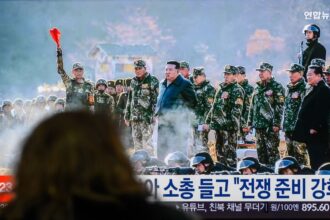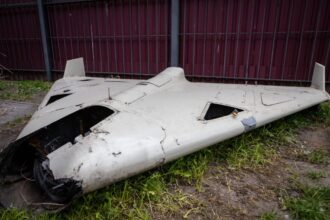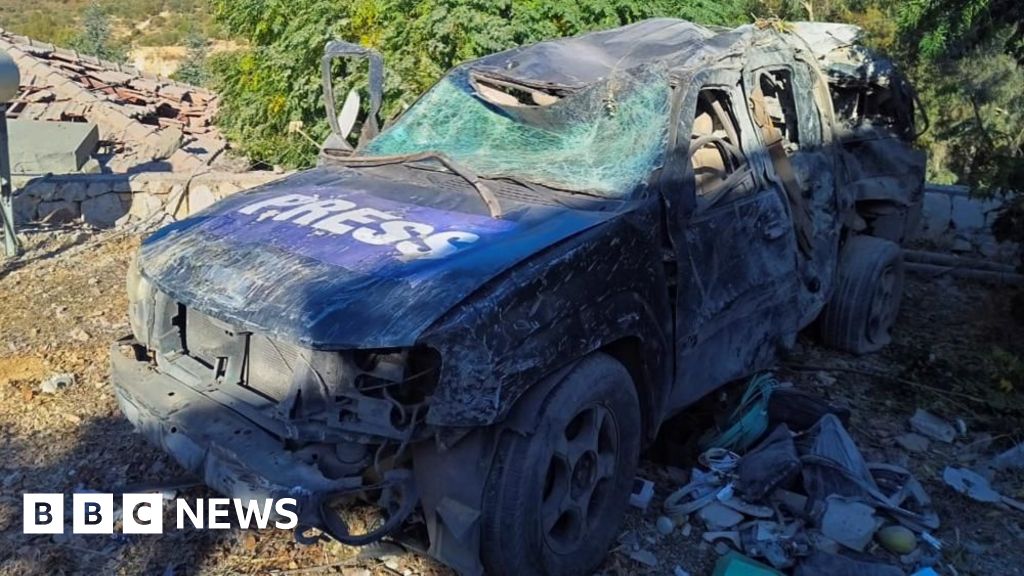BBC reports that three journalists were killed in an Israeli airstrike in the south-east Lebanon on a building believed to house reporters.
The attack took place on a guesthouse located in a compound near Hasbaya, which was used by at least seven different media organisations. A courtyard contained cars with the words “press” clearly displayed.
The broadcasters Al-Manar TV (Al Mayadeen TV) and Al-Manar TV (Al-Manar TV) released statements to pay tribute to their employees who were killed.
Lebanon’s Information Minister said the attack was deliberate, and called it a “warcrime”.
The Israeli military has yet to comment, but previously denied targeting journalists.
The victims were cameraman Ghassan Najir and engineer Mohamed Reda of the pro-Iranian Al Mayadeen news channel, as well Wissam Qassem of Al-Manar, which is affiliated with Hezbollah.
Three other people were also injured, according to the Lebanese Ministry of Health.
Five journalists, including Reuters journalist Issam Abudallah, had been killed by Israeli strikes in Lebanon in the past.
Al-Jadeed TV, whose journalists shared the house with them, broadcast footage of a bombed-out structure with a collapsed ceiling and floors covered in debris.
Satellite dish of a vehicle used to broadcast TV was mangled by cables near the vehicle.
“All official parties have been informed that this house is being used as a journalist’s stay-house.” “We coordinated with them all,” said an Al-Jadeed reporter, caked in dust from concrete, in a live broadcast, panting and coughing.
As the situation in Marj’youn became too dangerous, journalists from Lebanon covering the conflict south of the country were forced to move to Hasbaya.
Youmna Fawaz, a reporter from broadcaster MTV Lebanon told the BBC that the strike woke up journalists in the compound at around 03.00 local time (01:00 BST).
She said that the ceilings had collapsed on them and that they were surrounded with dust and rubble, and heard fighter jets flying overhead.
She said that each news organisation had its own building within the compound. The building housing al-Mayadeen journalists was “obliterated”, while al-Manar staff were inside.
Ms Fawwaz claimed that it was a media complex known as such by both Israel and Hezbollah.
“The airstrike had been carried out deliberately.” Everyone knew we were here. All the cars had labels that said “press and TV”. “We weren’t given a warning.”
She added: “They try to terrorize us just as they do in Gaza.” Israelis are trying prevent us from reporting the story.”
The minister of information in Lebanon accused Israel of targeting journalists with the intent to harm them, which is against international law.
Ziad Makary posted on X that “the Israeli enemy waited until the journalists’ evening break to betray” them in their sleep.
This is an assassination that was planned and designed in advance, as there were seven media institutions represented by 18 journalists.
Hasbaya is about five miles (8 kilometres) away from the Israeli border and is home to both Muslims and Christians. Recent weeks have seen attacks on the settlement’s periphery, but this was the very first attack on the settlement.
The attack is part of a larger conflict in Lebanon where Israel has intensified air strikes and launched a ground invasion in border towns and villages to the south.
In the last three weeks, the Lebanese authorities recorded more than 1,700 airstrikes across the country.
Hezbollah and Israel began fighting on 8 October, one day after Hamas attacked Israel and killed approximately 1,200 people. Since then, the Iran-backed armed groups has been firing drones and rockets into Israel as part of its “solidarity” campaign with Palestinians living in Gaza.
According to the health ministry, nearly 2,600 people have died in the current conflict in Lebanon. Many of these deaths occurred since Israel escalated its attacks on the 23rd September.
Around 60,000 people have been displaced in northern Israel by Hezbollah’s rocket fire. The Israeli government has declared that returning them to their home is a priority.
Satellite imagery analyzed by the BBC in southern Lebanon shows that Israel’s intensified bombardment campaign has caused more building damage in two weeks than it did during a year-long cross-border conflict.
Data shows that between 2 and 14 Oct, more than 3,600 buildings were damaged or destroyed in Lebanon – approximately 54% of total damage.
Read More @ www.bbc.com




